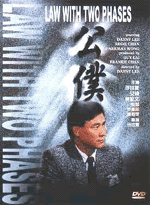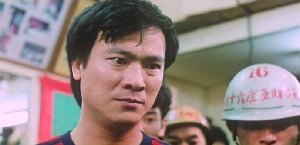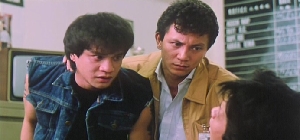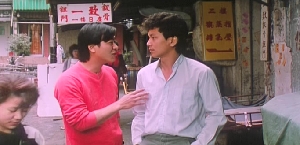
image courtesy of HK Flix
Rating:
8
AKA: Law with 2 Phases, Law with Two Faces
Year of release: 1984
Company: Always Good Film Co.
Genre: police drama
Running time: 95 mins.
Director: Danny Lee
Script: Danny Lee
Action director: Wong Sha Man
Producers: Guy Lai, Frankie Chan
Cinematography: Chan Hwa Ming
Editor: Shiu Fung
Stars: Danny Lee, Eddie Chan, Parkman Wong, Kam Hing Yin, Patricia Leung
Rated II for violence, language and drug use
Related links:
DVD Review
Danny Lee biography
Movie Review index
Main Page
This DVD is available for purchase at www.hkflix.com

Law with Two Phases

Danny Lee. Image courtesy of Universe.
In Hong Kong movies, as with other centers of cinema, there are certain actors known for particular roles: Chow Yun-Fat as a suave assassin, Jackie Chan as a comic kung-fu fighter and, of course, Danny Lee as a hot-headed cop. What might surprise many Western viewers is that Lee actually got his start in kung-fu movies (and the occasional oddity like Mighty Peking Man) before making his "true" on-screen persona known with this film, which was also his directorial debut. While it might be considered slow-moving by today's audiences weaned on MTV-inspired fare such as Gen-X Cops, Law with Two Phases (in this reviewer's opinion) still remains a powerful police drama that many modern films cannot match.
As someone who always wanted to be an officer (but for unknown reasons couldn't get into the police academy), Lee has always seemingly been obsessed with showing "real" police procedures in his movies, and Law with Two Phases would be the first in a long and continuing career trend for Lee. Not only would the movie bring him to stardom with a Hong Kong Film Award for his work in front of the camera, his HKFA-nominated work behind the lens would also provide inspiration for many poilce dramas to come. Though largely unrecognized by Western fans of the genre, Law with Two Phases is one of Lee's most solid films to date, even though there is an almost total absence of the ultra-violence which would later come to characterize his work.
Hong Kong police films before the 1980's were by and large drawn in shades of black and white. Lee himself appeared in a few of these, such as The Executor (a picture that also marked an early appearance of Chow Yun-Fat), which depended more on broad comedy and stilted action, rather than emotion and "blood and guts", to tell their stories. But movies like Dirty Harry inspired film-makers to bring a more true-to-life representation of life "behind the shield" to the screen. It is probably no small coincidence that Lee later named his production company "Magnum", after Harry Callahan's weapon of choice.
Along with pictures like Kirk Wong's The Club, Law with Two Phases helped usher in a new version of the police drama, where everything is painted in shades of grey, and tinged with social resonance and blows of violence. The gritty, almost documentary-like style was a bold charge against the almost cartoonish look of many action films of the time, and audiences, critics, and fellow directors responded. Within the span of a few years, the crime/cop drama was turned almost upside down. While it took John Woo's A Better Tomorrow to fully complete the transition, certainly Law with Two Phases had a large part in the evolution of the genre.

Parkman Wong (left) and Eddie Chan. Image courtesy of Universe.
Desite the impact it would later have, the plot in Law with Two Phases is pretty simple. Danny Lee plays a CID officer named B who takes a "new fish" named Kit (Eddie Chan) under his wing. As you might expect, B doesn't exactly play by the rules, as he gets most of his busts through a relationship with Blackie, a local hood (played by Parkman Wong). But B also has a sensitive side, as shown through the relationship with his mother, which Kit respects. The two being to form a solid friendship and all seems to be going well until a series of events turns B's world inside out and makes him question why he became a police officer in the first place.
While this kind of thing might not appeal to patrons looking for Tarantino-esque plot antics, this kind of simple -- but effective -- story telling, in my mind, is refreshing in this day and age, where too many film-makers equate complication with compentency. I would much rather see a simple story told well than a more involved one done half-way. The viewer should not necessarily need to be in the director's frame of thinking to enjoy a movie. Even though the simple plot might not give the impact of later movies like The Killer, the results here provide a much more enjoyable experience than many more experimental films.
Though there really is not much in the way of action in Law with Two Phases, what puts the film above similar fare is the power of the performances. Of particular note is Danny Lee's work. Unlike the straight-forward, almost robotic cops he would for the most part portray later, B lets his facade fall in parts and this makes the character more human and more appealing to the viewer. The supporting cast also does a good job, and Lee's style allows enough pathos into the movie without letting it becoming melodramatic.
If you want to see a film that conveys power through emotion rather than gunpower, and also represents some of Hong Kong's best work in the crime/police drama genre, you could do much worse than Law with Two Phases. Even though you won't see any slow-motion shots of people diving down with dual pistols, it's still a powerful movie that will stick with you after you finish watching it.
